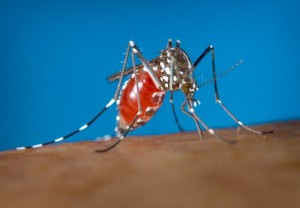The City of El Paso Department of Public Health announced this week that a local man was infected by the Chikungunya virus. It has been determined that the infection did not take place locally, but rather while the man was in the Caribbean, making
this the first travel-associated case to be detected in El Paso.

The primary mosquito vector for transmission is Aedes aegypti . This mosquito is present in El Paso and could serve as a vector for local transmission of Chikungunya. Humans serve as the reservoir for transmission. Potentially these cases can transmit the virus to mosquitoes in El Paso during their illness. While there is no reason for residents in El Paso to be alarmed, the following information is being provided as an educational tool about the symptoms and diagnosis of the disease.
The state of Texas has reported 30 imported cases so far in 2014.
Chikungunya virus is transmitted to people by mosquitoes. Outbreaks have occurred in countries in Africa, Asia, Europe, and the Indian and Pacific Oceans. In late 2013, Chikungunya virus was found for the first time in the Americas on islands in the Caribbean.
There is a risk that the virus will be imported to new areas by infected travelers. There is no vaccine to prevent or medicine to treat Chikungunya virus infection.
- Most people infected with Chikungunya virus will develop some symptoms, which usually
begin 3–7 days after being bitten by an infected mosquito. - The most common symptoms are fever and joint pain; other symptoms may include
headache, muscle pain, joint swelling, or rash. - Chikungunya disease does not often result in death, but the symptoms can be severe
and disabling. - Most patients feel better within a week. In some people, the joint pain may persist for
months. - People at risk for more severe disease include newborns infected around the time of
birth, older adults (≥65 years), and people with medical conditions such as high blood
pressure, diabetes, or heart disease. - Once a person has been infected, he or she is likely to be protected from future
infections. - Chikungunya symptoms are similar to those of dengue, another disease spread by mosquitoes.
- See your doctor if you develop the symptoms described above.
- If you have recently traveled, tell your doctor.
- Your doctor may order blood tests to look for Chikungunya or other similar diseases.
Dengue, another mosquito-borne virus, has been found in the United States on occasion – usually in people who have traveled abroad where Dengue is common. As many as 400 million people worldwide are infected with Dengue annually. In 2013, there were 13 cases of Dengue in Texas residents who did not have recent travel outside the United States.
Both Chikungunya and Dengue diseases may have similar symptoms such as headache, muscle pain, joint pain, and fever. Unfortunately, these symptoms are also common for some people who are infected with West Nile virus.
As of September 23, a total of 1,125 chikungunya virus disease cases have been reported to ArboNET from U.S. states. Eleven locally-transmitted cases have been reported from Florida

